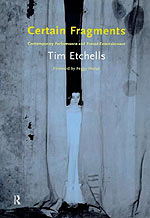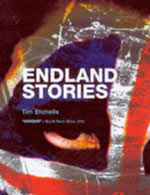Changing The World By Any Means Necessary | |

| I gave up thinking that music or art or writing could change the world a long time ago. After all, the moment 'polemic' or 'cause' - however well meant - enters the artistic equation, the whole thing generally falls apart. True, there are exceptions to the rule, but mainly politics in art needs a small 'p' and has to surprise us in the middle of the song or painting or book; although occasionally, of course, pure emotion, anger or feeling, cuts through the crap and surprises us all. As a writer, painter and publisher, I've learnt to hope that by doing what I do, change might subliminally occur - but that this change will most likely be personal, individual, and slight. Tim Etchells, a writer and performer, seemingly the 'main man' - or at least the most vocal member [can you be vocal on then page?] - of Forced Entertainment, would, I suspect, beg to differ. His book Certain Fragments [Routledge] is the most exciting, charged, challenging and politically acute arts book I've read in a long time. The book presents a chaotic and exhilarating take on the work and creative process of one of Britain's finest perfomance groups. Brutally honest, it questions, discusses, and dissects the group's working methods, shows and processes - all in the context of Conservative Britain: the crumbling, illiterate, desperate, grey decades spent in Sheffield creating and then touring new work. I was going to use the word cut-up to describe the book, but that's wrong, collage is, perhaps, what I mean. This book is full of carefully constructed counterpoint: paragraphs and sections pushed up and placed next to other paragraphs and sections on different themes and ideas, the edges and joins sparking anger, concern and wonder in the reader: concern and outrage at the plight of those lost in today's world, delight in the city's chaos and the effect of drink, anger at our/their inability to clearly articulate emotion and feeling, wonder at the possibilities of 'drama' - at what can happen in front of an audience. What performance can do for those involved, and for those watching, when actors collaborate, think and open themselves up to possibility. Just for it's ideas on collaboration this book is worth the money and your attention; just for it's political rants and dissection it's worth the money and your attention; just for the barbed wit and fizz of the whole thing, the shared ups & downs, the brutal self-examination and honesty, the utter passion, it's worth your time, money and attention. |
The only book I can compare Certain Fragments to is Julian Beck's The Life Of The Theatre [originally a New Directions book; more recently reissued by Limelight Editions], another 'theatre book' with wide repercussions for all the arts. Beck and his anarchist theatre troupe, The Living Theatre, documented their social, sexual and community experiments and struggles, all the time engaging in overtly political theatre and demonstration. Whilst couched in the language of the late 60s - never quite getting to grips with the implications of 'free love', sexual liberation and gender; still bound up in the hippy mysticism of the time - the text still carries implications for us all. Beck cuts through the crap and asks the important questions that nag at every artist worried about the state of the world in relation to self-obsession, ego and the arts; this quote, for instance, has haunted me since I first read it 20 years ago: 'We are a feelingless people. If we could really feel, the pain would be so great that we would stop all the suffering. If we could feel that one person every six seconds dies of starvation, (and as this is happening, this writing, this reading, someone is dying of starvation) we would stop it. if we could really feel it in the bowels, the groin, in the throat, in the breast, we would go into the streets and stop the war, stop slavery, stop the prisons, stop the killings, stop destruction. Ah, I might learn what love is.' Beck took on the world, and almost won; certainly he was not defeated, even when locked up in prison or watching a performance fail - his dream of a practical utopia was too strong, his concern, anger, love and artistic vison too real and lasting. His poems, journals and other writing remain vital, even after his death. Etchells, similarly, takes on the despair and chaos of the late 20th Century, wanting to 'change the world by any means necessary', prepared to admit the task is by no means easy or obvious and that it will involve 'difference, collisions, incompatibilities'. Both dramatist/writers share an aggression, a desire for exploration, and a genuinely visonary stance; both are/were willing to take professional and personal risks. For them, experiment is/was about more than what happens on a stage in front of an audience: it involves/involved rehearsals, community and collaboration: the whole life of the actors bound up and exploring their world and art together. | |

| Tim Etchells, I'm sure, would reject the term 'shamanism', Julian Beck might not; but shamanism is at the heart of David Almond's new novel, Secret Heart [Hodder] - supposedly, like his other books, 'for children' - and it seems to me that the juxtapositions at work in Almond's book are similar to some of the dislocations that happen in Forced Entertainment's work. In Secret Heart, Joe Maloney, who lives in a grim Northern town, hears the pad of tiger feet in his dreams as a raggedy circus arrives in town. Events lead to new friendships, confrontation with the locals and a mesmerising all-night journey where everything is resolved, and all becomes clear [though, to give Almond his due, there is no simplistic happy ending - the jeers, taunts and abuse of the townspeople remain at the end of the book, as does the run-down town itself]. The circus may have given its final show, but Joe's brave actions [as tiger spirit as much as in 'real life'] mean everyone can rest at ease: although unpsecified, some kind of curse has been lifted. The circus is also the subject of Robert Lax's Circus Days and Nights [Overlook, USA], but here there is no fiction, just careful observation and spiritual metaphor. Lax spent time on the road with various small circuses, befriending the performers, even occasionally clowning in the ring, and wrote these prose-poems and poems throughout his travels. He not only truly sees the world of the acrobat, jugglers, clowns, animals and animal trainers - both in and out of the ring, he carefully locates the world of the performers - all sequins and glitter, within the real world, as days and nights and place after place pass by. Three long works, one previously unpublished, constitute this beautiful hardback volume. |

| Carnival, not circus, is one of the subjects of Odo Hirsch's Hazel Green [Bloomsbury], supposedly another book for children. In it Hazel struggles to involve the children in her apartment block in the annual city parade. The struggles within her 'gang', and her dealings with the adult world are clear and forthright; the book seems set in a strangely timeless european city where old-fashioned shops still function, women call their dresses 'gowns', and neighbours talk to each other. Strange - because the author is Australian and the book is a new one! Anyway, even though adults will see where this story is heading - a succesful parade and a new friendship with Yak [no, Yak, a new kid in town, not a yak] - this is an enjoyable tale. Tim Etchells is also the author of Endland [Pulp Books], a gathering of much harsher writing than his theatre pieces, also set in the city. Here Etchells offers little humour or relief and, though inventive and well-paced, I felt the work to be unremittingly oppressive and almost offensive in its cultural and social assumptions and stereotypes. After all the 'Soft Southern Gits / Hard Northern Bastards' scenario is pretty dated now - I mean I almost commissioned a poetry anthology with this title once, a long time ago, but the notion quickly became dated and implausible as wine bars and yuppies colonised the whole country. Anyway, if you like snappy, grim, fragmented short stories about ciphers like 'Meniscus' and the 'Crash Family Robinson' who live in a strangely familiar bleak cityscape here it is: Endland is a book the despresive cynic in you will enjoy. |

| The same kind of city landscape informs Bill Broady's recent - and more traditional - book of short stories, In This Block There Lives a Slag... [Flamingo]. Broady's characters struggle for ephiphany and enlightenment within their narrow world, seeking it through any means possible. Most succesful, though I am biased because of the subject matter, is 'A Short Cut Through the Sun', a story set in Ronnie Scott's jazz club during a Sun Ra concert! The title story is intriguing, too, although I feel the author wants the graffiti of the title, painted twenty-feet high on a tower block, to be more symbolic and 'loaded' than it actually is: he struggles, and for me fails, to make the story more than 'grim oop north' documentation. Elsewhere, the relentlessly bleak scenarios become tiring, although the oddbeat invention of characters like Jacob, a wrestling sheep featured in the first story, is amusing - although, again, the heavyhanded suggestion of a 'higher meaning' [in this case the Biblical story of Jacob wrestling with an angel], doesn't in the end either help the story or mean that there is a higher meaning! Still, it's these strange happenings, these strange cityscapes, that Tim Etechells and Forced Entertainment have also made their own; maybe 'world is crazier and more of it than we think' - to quote Louis MacNeice. I'm glad authors and performers are still paying attention and taking note; still trying to change things - by any means necessary. © Rupert Loydell 2001 2001 |